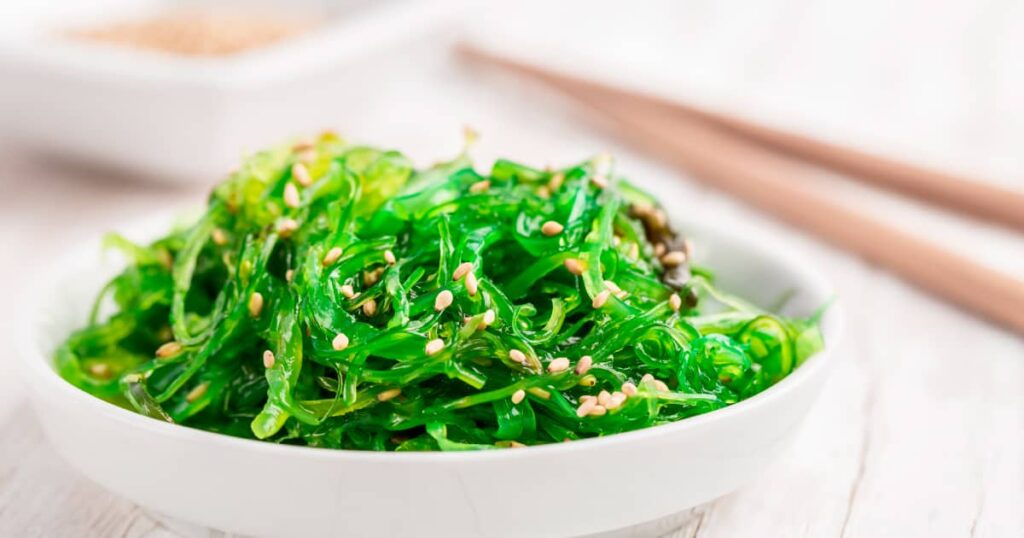Wakame a type of edible seaweed, has been captivating the culinary world with its unique flavor profile and impressive nutritional benefits. Originating from the waters of the Pacific and Atlantic Oceans, this marine vegetable has found its way into diverse cuisines, adding a touch of umami and a plethora of health advantages to various dishes. In this article, we will delve into the origins, culinary uses, nutritional content, and potential health benefits of wakame, shedding light on why this seaweed has become a celebrated ingredient in kitchens worldwide.
Origins and Varieties
Wakame belongs to the family of brown algae, scientifically known as Undaria pinnatifida. Native to East Asia, specifically Japan, China, and Korea, wakame has become a staple in these countries’ diets. However, due to its increasing popularity, it is now cultivated and consumed globally.
There are different varieties of wakame, with the most common being the Undaria pinnatifida, often referred to as mekabu in Japan. Other notable varieties include Alaria esculenta and Undaria alata. Each type has its unique characteristics, taste, and culinary uses, contributing to the versatility of wakame in various dishes.
Culinary Uses
Wakame is renowned for its versatility in the kitchen, as it can be used in a variety of dishes, ranging from traditional Japanese cuisine to contemporary Western recipes. The most common culinary application is in soups and salads, where its tender texture and subtle briny flavor enhance the overall taste of the dish.
One of the classic Japanese dishes featuring wakam’e is miso soup. The seaweed is added to the broth along with other ingredients like tofu and green onions, creating a harmonious blend of flavors. In salads, wakam’e is often rehydrated and tossed with fresh vegetables, sesame seeds, and a light soy-based dressing, resulting in a nutritious and delicious side dish.
Moreover, wakam’e is increasingly finding its way into other cuisines, such as Mediterranean and fusion dishes. Chefs and home cooks alike are experimenting with this seaweed, incorporating it into pasta dishes, stir-fries, and even as a topping for sushi rolls.
Nutritional Content
Beyond its culinary appeal, wakame is a nutritional powerhouse, packed with essential vitamins, minerals, and antioxidants. Here is a breakdown of the key nutrients found in wakame:
Vitamins: Wakame is rich in vitamins A, C, E, and K. These vitamins play crucial roles in supporting immune function, maintaining healthy skin, promoting blood clotting, and acting as antioxidants to combat oxidative stress.
Minerals: Wakame is an excellent source of minerals such as iodine, calcium, magnesium, and iron. Iodine is particularly important for thyroid health, while calcium and magnesium contribute to bone strength and overall well-being.
Omega-3 Fatty Acids: Wakame contains omega-3 fatty acids, essential for heart health, reducing inflammation, and supporting brain function. Incorporating wakam’e into your diet is a tasty way to boost your omega-3 intake.
Dietary Fiber: Like many other seaweeds, wakame is a good source of dietary fiber, which aids in digestion, promotes a feeling of fullness, and helps regulate blood sugar levels.
Protein: While not as high in protein as some animal-based sources, wakam’e still provides a notable amount of plant-based protein, making it a valuable addition to vegetarian and vegan diets.
Potential Health Benefits
The consumption of wakame is associated with several potential health benefits, making it a valuable addition to a balanced diet:
Thyroid Health: The high iodine content in wakame supports thyroid function. Adequate iodine is essential for the production of thyroid hormones, which play a crucial role in regulating metabolism.
Heart Health: The omega-3 fatty acids in wakame contribute to heart health by reducing inflammation, lowering blood pressure, and improving cholesterol levels. These factors collectively support cardiovascular well-being.
Antioxidant Properties: Wakame contains various antioxidants, including vitamins A and C, which help neutralize free radicals in the body. This may contribute to a reduced risk of chronic diseases and support overall cellular health.
Bone Health: The calcium and magnesium content in wakame support bone health and may help prevent conditions such as osteoporosis. Including wakame in your diet is a flavorful way to fortify your bones.
Weight Management: The dietary fiber in wakame promotes a feeling of fullness, which can aid in weight management by reducing overall calorie intake. Additionally, the seaweed’s low calorie and fat content make it a healthy addition to meals.
Cautions and Considerations
While wakame offers numerous health benefits, it is essential to consume it in moderation and be mindful of potential risks. Excessive iodine intake, for example, can lead to thyroid dysfunction. Individuals with thyroid conditions or iodine allergies should exercise caution and consult with a healthcare professional before incorporating wakame into their diet.
Conclusion
Wakame, with its rich history, diverse culinary applications, and impressive nutritional profile, stands as a testament to the bountiful offerings of the ocean. As the world continues to explore and embrace diverse and nutritious foods, wakame emerges as a flavorful and healthful addition to our tables. Whether enjoyed in traditional Japanese dishes or incorporated into innovative, global recipes, wakame’s unique taste and nutritional benefits make it a truly remarkable ingredient that enriches both the palate and the body. So, why not dive into the world of wakame and experience the delights it brings to your culinary adventures and well-being.







